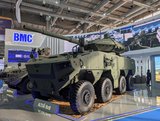GDLS receives Abrams FMS contract
M1A2 Abrams MBT. (Photo: US Army/ Sgt Nathan Franco).
General Dynamics Land Systems (GDLS) has received a $93.52 million contract for engineering, manufacturing, design and production of the M1A2 Abrams MBT for an FMS customer.
Bids were solicited via the internet but GDLS was the only company to respond to US Army Contracting Command, the DoD announced on 10 December.
Work will be performed in Lima, Ohio, with an estimated completion date of 30 September 2025.
The contract is funded from the FY2019 FMS budget. While the DoD did not divulge the identity of the customer, Taiwan received FMS approval for M1A2Ts in July 2019.
A potential $2 billion package would include 108 M1A2T Abrams plus associated subsystems, 14 M88A2 Hercules recovery vehicles, 16 M1070A1 heavy transporters plus support, logistics and training services.
The Taiwan Central News Agency subsequently reported that Taiwan was preparing to receive four batches of M1A2Ts between 2023 and 2026, with funding as follows: 18 tanks in 2022, 18 in 2023, 28 in 2024, 30 in 2025 and 14 in 2026.
In addition to US-made training simulators delivered as part of the FMS package, Taiwan's National Chung-Shan Institute of Science and Technology will develop its own simulators for use with the M1A2T.
Related Programmes in Defence Insight
Related Equipment in Defence Insight
More from Land Warfare
-
![US Army plans Q2 prototype proposal request for its Mobile Tactical Cannon programme]()
US Army plans Q2 prototype proposal request for its Mobile Tactical Cannon programme
The US Army is seeking a mature 155mm, wheeled, self-propelled capability to replace the towed M777 howitzer in the Stryker, Mobile and Infantry Brigade Combat Teams as it targets a potential 498-unit acquisition goal.
-
![British Army’s Project Stokes 120mm mortar bids due in March 2026]()
British Army’s Project Stokes 120mm mortar bids due in March 2026
Project Stokes could see a new 120mm mortar capability enter British service, with domestic production and international partnerships central to competing bids.
-
![MKJ Warrior Series — The Nett Warrior Qualified Connector for Today’s Soldier Systems]()
MKJ Warrior Series — The Nett Warrior Qualified Connector for Today’s Soldier Systems
ITT Cannon’s MKJ Warrior connectors are designed for the harshest environments, delivering mission critical comms, navigation and USB data/power.























